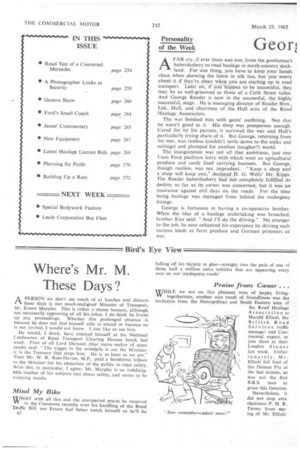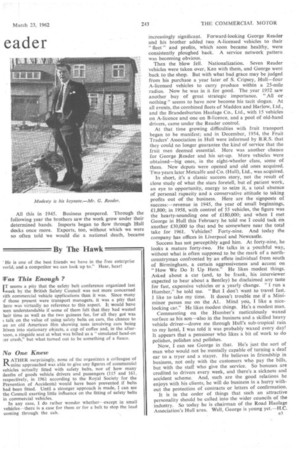Where's Mr. M.
Page 36

Page 37

If you've noticed an error in this article please click here to report it so we can fix it.
These Days?
I—I A PERSON we don't see much of at lunches and dinners these days is our much-maligned Minister of Transport, Mr. Ernest Marples. This is rather a shame because, although not necessarily approving of all his jokes, I do think he livens up any proceedings. Whether this prolonged absence is because he does not find himself able to attend or because he is not invited, I would not know. I just like to see him. He would, I think, have enjoyed himself at the National Conference of Road Transport Clearing Houses lunch last week. First of all Lord Derwent (that suave seeker of more roads) said: "The nigger in the woodpile is not the Minister, it is the Treasury that stops him. He is as keen as we are." Then Mr. W. R. Rees-Davies, M.P., paid a handsome tribute to the Minister for his education of the public in road safety. With this, in particular, I agree; Mr. Marples is an indefatigable teacher of his subjects (us) about safety, and seems to be enjoying results.
Mind My Bike
WAT with all this and the unexpected praise he received in the Commons recently over his handling of the Road Traffic Bill, our Ernest had better watch himself or he'll be B2
falling off his bicycle in glee—straight into the path of one ot those half a million extra vehicles that arc appearing every year on our inadequate roads!
Praise from Ccesar . .
WHILE we are on this pleasant note of happy livingtogetherness, another nice touch of friendliness was the invitation from the Metropolitan and South Eastern area of the Road Haulage Association to Harold Elliott, the British Road Services traffic manager and Continental expert, to join them at their London dinner last week. Unfortunately, Mr. Elliott fell foul of the Demon Flu at the last minute, so was not the first B.R.S. man to grace this function.
Nevertheless, it did not stop area chairman P. H. R. Turner from saying of Mr. Elliott:
' He is one of the best friends we have in the free enterprise vorld, and a competitor we can look up to." Hear, hear!
Tiros This Enough ?
[T seems a pity that the safety belt conference organized last Lweek by the British Safety Council was not more concerned vith commercial vehicle applications than it was. Since many )f those present were transport managers, it was a pity that here was virtually no reference to this aspect. It would have )een understandable if some of them felt that they had wasted heir time as well as the two guineas fee, for all they got was talk on the value of using safety belts on cars, the chance to ;ee an old American film showing tests involving cars being 'riven into stationary objects, a cup of coffee and, in the afterloon, a ringside seat at what was billed as a "simulated head-on :ar crash," but what turned out to be something of a fiasco.
No One Knew
RATHER surprisingly, none of the organizers a colleague of mine approached was able to give any figures of commercial vehicles actually fitted with safety belts, nor of how many deaths of goods vehicle drivers and passengers (115 and 161, respectively, in 1961 according to the Royal Society for the Prevention of Accidents) would have been prevented if belts had been fitted. Until a stronger approach is made, I can sec the Council exerting little influence on the fitting of safety belts in commercial vehicles.
In any case, I do rather wonder whether—except in small vehicles—there is a case for them or for a belt to stop the load coming through the cab.




















































































































